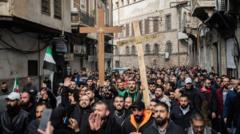Protests have ignited in Syria over the controversial burning of a Christmas tree, driving citizens to call on the new Islamist authorities for stronger measures to protect minority groups. A widely circulated video showed the tree ablaze in Suqaylabiyah, a town with a significant Christian population in central Syria. Hayat Tahrir al-Sham (HTS), the predominant Islamist faction responsible for toppling President Bashar al-Assad, announced the detention of foreign fighters implicated in the incident.
Footage revealed masked individuals pouring an unknown substance on the tree just before Christians were set to celebrate Christmas Eve, creating ambiguity about their intentions – whether to extinguish the flames or fuel them further. In response to the public's distress, an HTS religious figure pledged that the damaged tree would be restored before morning festivities, even displaying a cross as a gesture of solidarity, which stands in stark contrast to the group's usual conservative stance.
As protests unfolded in various locations including parts of Damascus, demonstrators voiced their discontent, particularly regarding foreign fighters’ presence in the country, chanting "Syria is free, non-Syrians should leave." In one of the capital's neighborhoods, protesters paraded a cross alongside Syrian flags while echoing “we will sacrifice our souls for our cross." One participant, Georges, expressed his frustration to AFP, stating, "If we're not allowed to live our Christian faith in our country as we used to, then we don't belong here anymore."
Syria hosts diverse ethnic and religious communities, yet the path forward for the new leadership remains uncertain after the recent coup which ousted the Assad regime after over five decades of rule. Many displaced citizens have begun returning home, with Turkey reporting the return of over 25,000 Syrians. However, the governing agility of the HTS group raises questions, having evolved from a jihadist organization into a group claiming to represent all Syrians.
HTS leaders recently made headlines by announcing plans to merge rebel factions under a newly formed Ministry of Defence, although skepticism looms over which groups this inclusion entails. The complexity of Syria’s armed landscape, coupled with HTS’s designation as a terrorist organization by several international entities, underscores the challenges ahead for the new regime.
While diplomatic shifts appear on the horizon, highlighted by the U.S. eliminating a bounty on HTS’s leader, the overarching concern lies in stabilizing the nation amid continued threats from foreign combatants and extremist factions. How the former jihadist group will navigate its new role as a governing force — and earn the trust of a diverse population — remains to be seen.
Footage revealed masked individuals pouring an unknown substance on the tree just before Christians were set to celebrate Christmas Eve, creating ambiguity about their intentions – whether to extinguish the flames or fuel them further. In response to the public's distress, an HTS religious figure pledged that the damaged tree would be restored before morning festivities, even displaying a cross as a gesture of solidarity, which stands in stark contrast to the group's usual conservative stance.
As protests unfolded in various locations including parts of Damascus, demonstrators voiced their discontent, particularly regarding foreign fighters’ presence in the country, chanting "Syria is free, non-Syrians should leave." In one of the capital's neighborhoods, protesters paraded a cross alongside Syrian flags while echoing “we will sacrifice our souls for our cross." One participant, Georges, expressed his frustration to AFP, stating, "If we're not allowed to live our Christian faith in our country as we used to, then we don't belong here anymore."
Syria hosts diverse ethnic and religious communities, yet the path forward for the new leadership remains uncertain after the recent coup which ousted the Assad regime after over five decades of rule. Many displaced citizens have begun returning home, with Turkey reporting the return of over 25,000 Syrians. However, the governing agility of the HTS group raises questions, having evolved from a jihadist organization into a group claiming to represent all Syrians.
HTS leaders recently made headlines by announcing plans to merge rebel factions under a newly formed Ministry of Defence, although skepticism looms over which groups this inclusion entails. The complexity of Syria’s armed landscape, coupled with HTS’s designation as a terrorist organization by several international entities, underscores the challenges ahead for the new regime.
While diplomatic shifts appear on the horizon, highlighted by the U.S. eliminating a bounty on HTS’s leader, the overarching concern lies in stabilizing the nation amid continued threats from foreign combatants and extremist factions. How the former jihadist group will navigate its new role as a governing force — and earn the trust of a diverse population — remains to be seen.





















